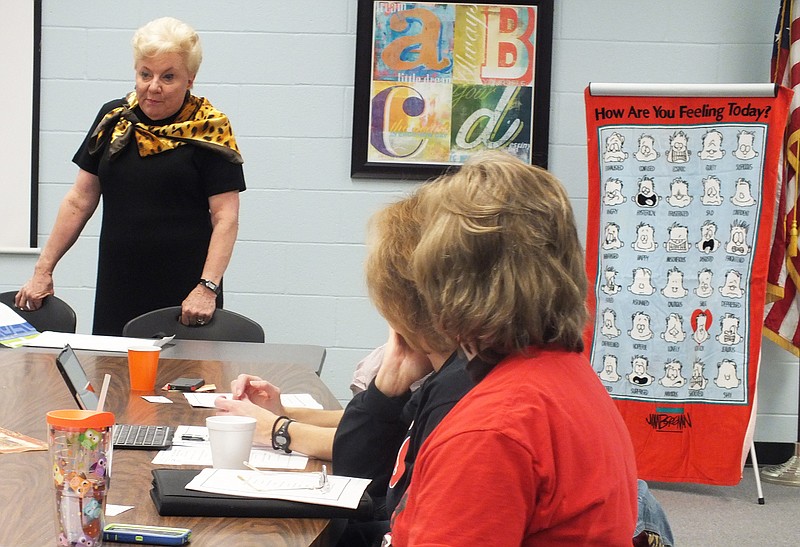School and city personnel and community business leaders joined to educate themselves to help others.
Invited by both Rick Neal, school superintendent, and Mayor Jackie Crabtree, school counselors, city department superintendents, pastors were in attendance Friday morning.
Judith Harvey, clinical therapist, master licensed social worker and addiction specialist, and Wanda Rodinsky, licensed clinical social worker, both with Team Harvey Therapeutic Services and Case Management presented "A community conversation concerning today's common mental health crises offering emergency intervention/descriptions/solutions for suicidal, non-suicidal crisis events" in the Professional Development Center at Pea Ridge schools.
"We're going to have a conversation and want you to be able to talk as if we were having a picnic," Harvey said.
"I was in law enforcement for 12 years, used to put 'em in jail and now I'm trying to keep them out," Harvey said.
"No one of us here today is so far removed from it," Rodinsky said. "Some people in geriatric program were attorneys ... Most of us get anxious or depressed, but we get over it. If we have ... in our genetics ...
"Depression runs in families," Rodinsky said. "This is a no-fault... no one comes into this world perfect and no one gets out alive."
"Worry today is sky high," Rodinsky said.
Harvey stated emphatically that information would be confidential. She said that is imperative to protect the clients.
Other mental health concerns included depression and anxiety disorders, psychosis and substance abuse disorders, eating disorders and bullying.
When in chronic stress, the body starts to break down, Rodinsky said, adding that too often people don't eat nutritiously and that, too, affects mental health.
Those in attendance could receive CEU credits, Harvey said.
Neal credited Crabtree with bringing the issue to him. The mayor, in opening the session, told of personal experience with people who have had problems with depression.
"No one is exempt," Crabtree said.
More natural disasters -- ice storms, floods, power outages -- are occuring, Rodinsky said, explaining that she wants to help people prepare to assist others in the community when disasters happen.
Harvey spoke to the group about releasing tension personnally and learning to help others release tension.
Dr. Karen Sherman, veterinarian and owner of Oak View Animal Clinic, spoke to the group about her experiences and concerns.
"It seems that in today's age of a fast-paced world, we come into contact with more people," she said, adding that being in business for 20 years has brought her into contact with many people and she has seen mental issues including depression and suicide risks often over the years including personally knowing people who have committed suicide.
Trying to find help for people with emotional or mental problems is difficult, Sherman said.
As Crabtree said in his introduction, "When someone has a cut on his arm ... or a broken leg, it's easy to see the wound. We don't always see mental or emotional wounds."
"It seems to be a stigma," Sherman said, "with suicides ... it's something we don't talk about. In doing that, the people that are looking for help in numerous ways, don't know where to go for help."
Someone told a story about a person who was "screaming for help" who was arrested.
Harvey said that often law enforcement personnel don't know what to do nor have alternatives.
"A lot of our social systems are breaking down," Rodinsky said, adding that sometimes the wait list is too long when people call for help and the paper work and cost is often prohibitive.
General News on 11/26/2014
